
Bushrangers were armed robbers who hid from authorities in the bush of the British colonies in Australia. The earliest use of the term applied to escaped convicts in the early years of the British settlements in Australia. By the 1820s, the term had evolved to refer to those who took up "robbery under arms" as a way of life, using bases in the bush.

Binda is a village in the Southern Tablelands region of New South Wales, Australia in Upper Lachlan Shire.

Carcoar is a small town in the Central West region of New South Wales, Australia, in Blayney Shire. In 2021, the town had a population of 271 people. It is situated just off the Mid-Western Highway 258 km west of Sydney and 52 km south-west of Bathurst and is 720 m above sea level. It is located in a small green valley, with the township and buildings on both banks of the Belubula River. It is the third oldest settlement west of the Blue Mountains. Carcoar is a Gundungurra word meaning either 'frog' or 'kookaburra'. Nearby towns are Blayney, Millthorpe, Mandurama, Neville, Lyndhurst and Barry

Situated on the Belubula River, Canowindra is a historic township and the largest population centre in Cabonne Shire. The town is located between Orange and Cowra in the central west of New South Wales, Australia. The curving main street, Gaskill Street, is partly an urban conservation area.
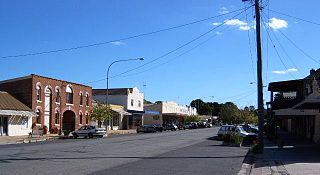
Gunning is a small town on the Old Hume Highway, between Goulburn and Yass in the Southern Tablelands of New South Wales, Australia, about 260 km south-west of Sydney and 75 km north of the national capital, Canberra. Nearby towns and cities are Cullerin, Gundaroo, Dalton, Yass, Murrumbateman and Goulburn.

Grenfell is a town in Weddin Shire in the Central West of New South Wales, Australia. It is 370 km (230 mi) west of Sydney. It is close to Forbes, Cowra and Young. At the 2011 census, Grenfell had a population of 1,996. The town is served daily by connecting NSW TrainLink services from Sydney via Bathurst and Lithgow. Grenfell is approximately 5 hours from Sydney and 2+1⁄2 hours from Canberra.

Johnny Gilbert was an Australian bushranger who was shot dead by the police at the age of 23 near Binalong, New South Wales on 13 May 1865.

Ben Hall was an Australian bushranger and leading member of the Gardiner–Hall gang. He and his associates carried out many raids across New South Wales, from Bathurst to Forbes, south to Gundagai and east to Goulburn. Unlike many bushrangers of the era, Hall was not directly responsible for any deaths, although several of his associates were. He was shot dead by police in May 1865 at Goobang Creek. The police claimed that they were acting under the protection of the Felons Apprehension Act 1865, which allowed any bushranger who had been specifically named under the terms of the Act to be shot, and killed by any person at any time without warning. At the time of Hall's death, the Act had not yet come into force, resulting in controversy over the legality of his killing.
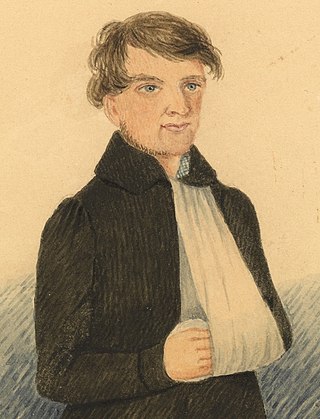
Lawrence Kavenagh was an Irish-Australian convict bushranger who, with Martin Cash and George Jones, escaped from Port Arthur, Van Diemen's Land, in late 1842. The three men took to bushranging for a six-month period, robbing homesteads and inns with seeming impunity. Kavenagh was tried for serious crimes on five separate occasions. He was executed in 1846 at Norfolk Island.
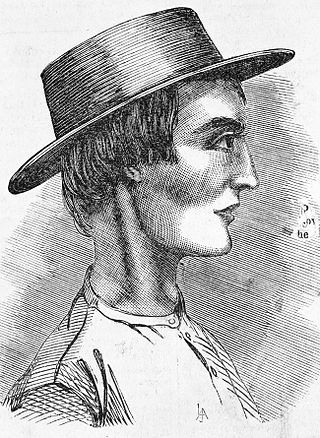
John Dunn was an Australian bushranger. He was born at Murrumburrah near Yass in New South Wales. He was 19 years old when he was hanged in Darlinghurst Gaol. He was buried in the former Devonshire Street Cemetery in Sydney.

Patrick Daley, known informally as 'Patsy' Daley, was a 19th-century Australian bushranger. Daley was the younger cousin of John O’Meally, a member of Frank Gardiner’s gang of bushrangers who robbed the gold escort near Eugowra in June 1862. By early 1863 Patsy Daley had joined with O’Meally and Ben Hall in a series of robberies carried out in the Young district. Daley was captured in March 1863 and sentenced to fifteen years hard labour. He was released in 1873. Daley married and settled in the Cobar district, becoming a successful businessman and hotel-owner.

Collector is a small village on the Federal Highway in New South Wales, Australia halfway between Goulburn and the Australian Capital Territory. It is seven kilometres north of Lake George. The name is also applied to the surrounding area, for postal and statistical purposes. At the 2021 census, Collector and the surrounding district had a population of 376 people.
The following lists events that happened during 1864 in Australia.
The Gardiner–Hall Gang was an informal group of bushrangers who roamed the central west of the Colony of New South Wales, Australia in the 1860s. Named after leaders Frank Gardiner and Ben Hall, the gang was involved in numerous shootouts and robberies, including Australia's largest ever gold robbery, at Eugowra Rocks. The gang had its origins in 1861; its demise came with the execution of John Dunn in 1866.

John Vane was an Australian bushranger who joined with the John Gilbert's gang for a short period during 1863. He rode with Gilbert, Ben Hall, John O’Meally and his friend Mick Burke, all of whom eventually met violent deaths. Burke, who had been Vane's childhood friend, died in a violent gun-fight at 'Dunn's Plains', near Rockley. Vane managed to avoid the fate of his companions when he gave himself up. In 1905 Vane collaborated with author and newspaper editor, Charles White, in recording his recollections of the period he spent as part of the bushranging gangs led by Gilbert, Hall and O’Meally. Vane’s biography, edited by White, was published in 1908.

John O'Meally, known informally as 'Jack' O'Meally, was an Australia bushranger. He was recruited to join the Gardiner–Hall gang to carry out the gold escort robbery near Eugowra in June 1862, Australia's largest gold theft. O'Meally became a member of the group of bushrangers led by Johnny Gilbert and Ben Hall, which committed many robberies in the central west of New South Wales. Considered to be the most violent and hot-headed of the group, O'Meally was probably responsible for two murders during this time. The gang managed to evade the police for long periods and became the most notorious of the bushranging gangs of the 1860s. Jack O'Meally was shot and killed during an attack on the 'Goimbla' station homestead in November 1863.
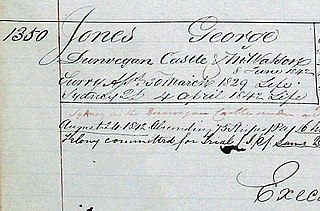
George Jones was a convict bushranger who, with Martin Cash and Lawrence Kavenagh, escaped from Port Arthur, Van Diemen's Land, in late 1842. The three men took to bushranging for a six-month period, robbing homesteads and inns with seeming impunity. After Kavenagh and Cash were captured, Jones remained at large for a further seven months, committing a number of robberies in company with two other escaped convicts. In April 1844 he was captured in a shoot-out with police, convicted and executed.

Lawrence Cummins, known informally as Larry Cummins, was a bushranger who operated primarily in the districts surrounding the Abercrombie River. In July 1863 he participated in the Mudgee mail robbery led by Fred Lowry and John Foley. Soon afterwards Cummins and his younger brother John carried out several robberies. They were identified and John Cummins was apprehended; he was accidentally shot and killed while being escorted by police constables. Three weeks later Cummins was captured with his associate Lowry, in an encounter with the police which resulted in Lowry’s death. Cummins was sent to Berrima Gaol in late 1863, from where he escaped in November 1866 with another prisoner. From December 1866 to April 1867 Cummins carried out a series of audacious robberies. In April, during an attempted robbery of Webb's store on the Fish River in company with John Foran, he received a wound in the face from birdshot. He was captured soon afterwards and sentenced to thirty years hard labour and sent back to Berrima Gaol.
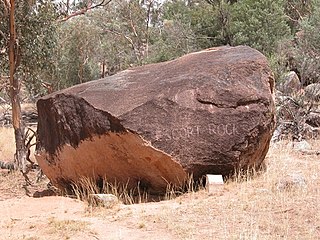
Escort Rock is a heritage-listed geological formation at Escort Way, Eugowra, Cabonne Shire, New South Wales, Australia. It is one of a group of historic sites labelled the Ben Hall Sites for their association with bushranger Ben Hall, along with Ben Hall's Death Site, the Bushranger Hotel, Cliefden, the Grave of Ben Hall and Wandi. It was added to the New South Wales State Heritage Register on 8 October 2010.
Bushranger Hotel is a heritage-listed hotel located at 24 Church Street, Collector, in the Southern Tablelands region of New South Wales, Australia. It is one of a group of historic sites labelled the Ben Hall Sites for their association with bushranger Ben Hall, along with Ben Hall's Death Site, Cliefden, Escort Rock, the Grave of Ben Hall and Wandi. It was built from 1860 to 1861. It is also known as Kimberley's Commercial Hotel and Kimberley's Inn. It was added to the New South Wales State Heritage Register on 8 October 2010.


















